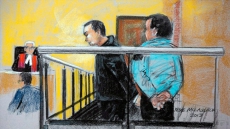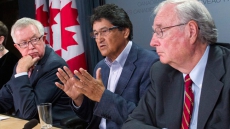VANCOUVER - British Columbia's teachers' strike is sailing into uncharted waters, with no resolution on the horizon for the turbulent dispute that has delayed the start of the school year for the first time in provincial history.
Labour experts are advising families to prepare for at least a couple of weeks without school as the union and the provincial government butt heads in the media, with no plans to get back to bargaining.
"It's a matter of who's going to outlast the other," said industrial relations Prof. Tom Knight, with the University of British Columbia.
"Because it's such a public issue, you've got all sorts of spin happening. Both parties are vying for public support, and so are characterizing the other party as the villain and themselves as doing the right and just thing."
On Thursday, Education Minister Peter Fassbender confirmed the government had lifted lock-out notice and urged the union for a third time to suspend its walkout so the parties could attempt to negotiate a settlement.
The B.C. Teachers' Federation told its picketing members in a memo that a news conference by Premier Christy Clark a day prior was "inflammatory and error-ridden," and vowed to carry on striking.
The stalemate means 40,000 teachers aren't getting paid while the province's half-a-million public school children are missing lessons.

A complex series of issues, ranging from wages and benefits to court decisions about which party should have control over classroom makeup policies, stand in the way of a negotiated deal.
Knight said teachers facing financial hardship have almost no leverage left, but their commitment in what is "almost a holy war" makes it unlikely that they will back down or compromise. The government isn't budging from the economic settlement pattern it has set with more than 150,000 members in other public sector unions, he added.
Few experts were willing to forecast the ultimate outcome.
"Lawyers generally like to sit around and make their predictions so they can say, 'See, I called it,' but nobody is doing that in this case," said labour lawyer Ritu Mahil, with the firm Lawson Lundell. "I don't want to sound negative, but there is that indefinite feeling. It could be a very lengthy dispute."
Should neither side offer a way out, there are still several options that would put children back in school, said the labour experts.
Binding arbitration: Both sides could mutually agree on a person to impose a settlement that everyone would have to accept. The union has said it's open to the possibility, while the government has rejected the proposal.

Labour Relations Board: Either side, though more likely it would be the employer on behalf of government, could apply an essential services designation to compel teachers back to work. But Mahil said pressure won't mount for some time, because previous rulings by the board found two weeks of strike action wasn't a "serious and immediate disruption" to children's education.
If the province decided to go this route, it would likely involve lengthy evidentiary hearings during which the board would be asked to establish what curriculum is critical for which students, said Mahil, who has served two terms as vice-chair of the board.
Legislation: Government has stated for months it will not use a political mechanism to send teachers back to work, as it has done several times previously. Knight, however, suggested he believes the province might do an about-face, giving teachers the same wage hike it has promised all along.
Consultant Jerry Mussio, a former B.C. senior bureaucrat, witnessed dozens of heated conflicts between the teachers and government during the 30 years he worked for the education ministry. Union work-to-rule, walkouts and rotating strikes always seemed to leave governments on the defensive, typically resolving the conflict with legislation, he said.

"I'm certain that the current government understood this long history, were tired of BCTF intimidation tactics and decided to play tough," he said, describing the situation as similar to playing hockey against a brawny opponent.
"At a certain point you realize that in order to compete, you have to bring some muscle to the game. So they hired a top law firm and a tough negotiator and we've been witness to an old-time labour brawl."





